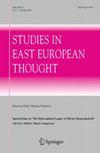乔治-弗洛洛夫斯基致戴维斯-麦考伊的信
IF 0.5
3区 哲学
Q4 ETHICS
引用次数: 0
摘要
Georges Florovsky 致 Davis McCaughey 的信是在阅读《原子能时代》报告后的反思:委员会的报告》(1946 年)后的反思。弗洛洛夫斯基提出了自己反对发展核武器及其使用研究的论点。这些论点包括:把对世界进行技术改造的尝试视为人类把自己放在上帝的位置上,即成为上帝人的主张。另一组反对使用原子弹的控诉涉及伦理问题和人类对战争的责任。弗洛洛夫斯基的信是他对原子弹威胁讨论的贡献。本文章由计算机程序翻译,如有差异,请以英文原文为准。
Georges Florovsky: Letter to Davis McCaughey
The letter from Georges Florovsky to Davis McCaughey is a reflection after reading the Report The Era of Atomic Power: Report of a Commission (1946). Florovsky gives his own arguments against the development of research concerning nuclear weapons and their use. These include: treating an attempt at a technical transformation of the world as a human claim to put oneself in God’s place, i.e., to be a God-man. Another group of indictments against the use of the atomic bomb concerned ethical issues and human responsibility for the war. Florovsky’s letter is his contribution to the discussion on the threat posed by the atomic bomb.
求助全文
通过发布文献求助,成功后即可免费获取论文全文。
去求助
来源期刊

Studies in East European Thought
Multiple-
CiteScore
0.50
自引率
0.00%
发文量
69
期刊介绍:
Studies in East European Thought (SEET) provides a forum for impartial scholarly discussion of philosophical thought and intellectual history of East and Central Europe, Russia, as well as post-Soviet states. SEET offers a venue for philosophical dialogue in a variety of relevant fields of study. Predominantly a philosophical journal, SEET welcomes work that crosses established boundaries among disciplines whether by bringing other disciplines to respond to traditional philosophical questions or by using philosophical reflection to address specific disciplinary issues.
The journal publishes original papers by scholars working in the field without discriminating them based on their geographical origin and nationality. The editorial team considers quality of work to be the sole criterion of publication. In addition to original scholarly essays, SEET publishes translations of philosophical texts not previously available in the West, as well as book reviews.
* A forum for scholarly discussion on philosophical thought and intellectual history of East and Central Europe, Russia, and post-Soviet states
* Includes analytic, comparative, and historical studies of thinkers, philosophical and intellectual schools and traditions
* In addition to original papers, publishes translations and book reviews
* Although formatting is not crucial at the review stage, authors are strongly advised to refer to the Submission Guidelines of SEET to which articles accepted for publication must conform
 求助内容:
求助内容: 应助结果提醒方式:
应助结果提醒方式:


